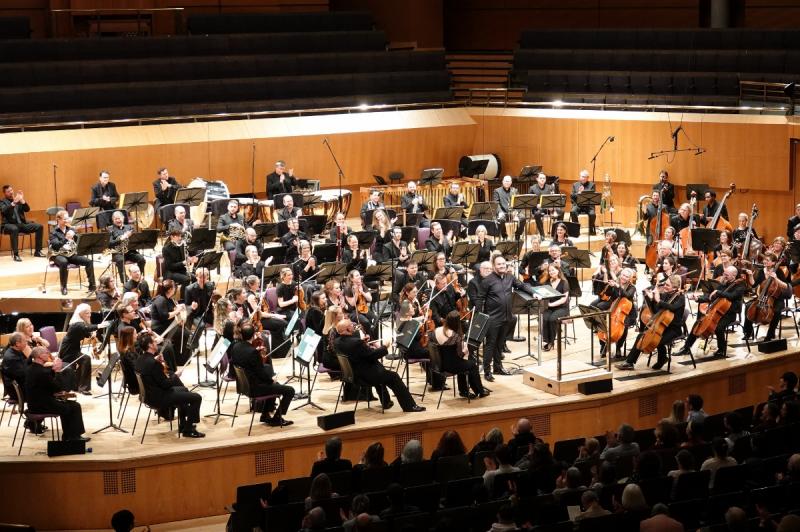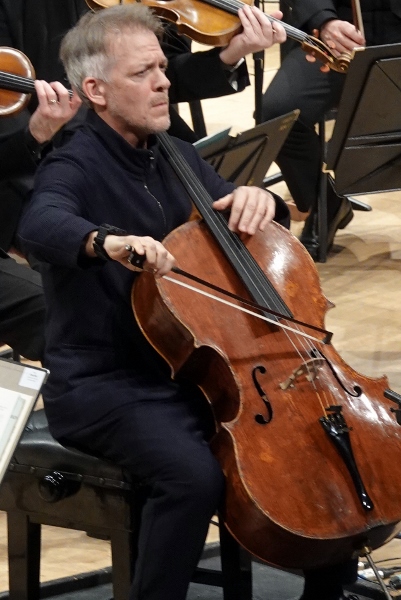Gerhardt, BBC Philharmonic, Gernon, Bridgewater Hall, Manchester review - calm and clear conducting | reviews, news & interviews
Gerhardt, BBC Philharmonic, Gernon, Bridgewater Hall, Manchester review - calm and clear conducting
Gerhardt, BBC Philharmonic, Gernon, Bridgewater Hall, Manchester review - calm and clear conducting
Maybe not perfect, but when things worked, they worked beautifully

Ben Gernon’s calm and clear way of conducting an orchestra (something he once told me he’d observed in the work of his mentor, Colin Davis) is good to watch and, I would guess, welcomed by those he directs. Since his time with the BBC Philharmonic as principal guest conductor (2017-2020) he’s been a welcome visitor to them in Manchester and Salford, and this programme pulled a good crowd and was indeed very rewarding.
That doesn’t mean that everything they did together was perfect, but when it worked, it worked beautifully. Beginning a programme with something that needs instant tenderness and delicacy is a test at any time: it’s not easy. Shostakovich’s arrangement of “Prelude (Dawn on the Moscow River)” from Mussorgsky’s Khovanshchina opera got there in the end, though, as, after birdcall effects in the woodwind that were vividly avian, the strings began to produce the kind of gentle intensity that Gernon had probably been hoping for from the start. The final phrase, from John Bradbury’s pure and poised clarinet, brought a deliciously dying fall to the entire sequence.
 There’s more tenderness and delicacy in Anna Clyne’s DANCE, her already much-loved cello concerto of 2019, which was performed by Alban Gerhardt (pictured left). Despite the title, it’s not all bouncy stuff by any means, more often dreamily intriguing in its five discrete movements that explore repetition, cycles and repeated cycles (or loops, as we say in these days of electronica). There are simple things to enjoy here: lovely short phrases that were heard from the cello and then the wind in the opening movement, folksong-style tunes with drone effects in the second, repeating sequences of harmonised textures, chaconne-style, in the third, a kind of multi-voice canon in the fourth, and a really lovely melody in the fifth, to bring everything to a close. In it all the cello has to soar and fly to stratospheric heights of harmonics at times, to sing from a soulful D-string at others, to grumble away in its nether regions sometimes, and latterly to scrub frantically as a prelude to the luminescence of the last few minutes. Gerhardt was the master of all these – self-effacing enough to avoid hogging the limelight, but serenely focused where the solo role called for star quality.
There’s more tenderness and delicacy in Anna Clyne’s DANCE, her already much-loved cello concerto of 2019, which was performed by Alban Gerhardt (pictured left). Despite the title, it’s not all bouncy stuff by any means, more often dreamily intriguing in its five discrete movements that explore repetition, cycles and repeated cycles (or loops, as we say in these days of electronica). There are simple things to enjoy here: lovely short phrases that were heard from the cello and then the wind in the opening movement, folksong-style tunes with drone effects in the second, repeating sequences of harmonised textures, chaconne-style, in the third, a kind of multi-voice canon in the fourth, and a really lovely melody in the fifth, to bring everything to a close. In it all the cello has to soar and fly to stratospheric heights of harmonics at times, to sing from a soulful D-string at others, to grumble away in its nether regions sometimes, and latterly to scrub frantically as a prelude to the luminescence of the last few minutes. Gerhardt was the master of all these – self-effacing enough to avoid hogging the limelight, but serenely focused where the solo role called for star quality.
Rachmaninov’s Symphony No. 2 was again a work that called for a sweet, pure blend in its opening bars and didn’t entirely get it. But Gernon can build a thrilling crescendo, and the Philharmonic was soon in its familiar, full-throated voice. The allegro of the first movement was neatly done, the rhythmic units well shaped and the string tone nicely varied, with only the briefest of fuzzy lines here and there.
Things really came right from the second movement on. That scherzo was driven and powerful, the orchestra playing like the virtuosi they frequently can be, and the adagio third movement, much as it might often seem a simple wallow in romantic feeling, was controlled, integrated and genuinely expressive. The finale’s impact was fresh and exhilarating, from Gernon’s emphasis on making rhythmic detail audible in its welter of big, resonant sound, and his insistence on keeping the pulse moving despite the temptations of those big, heroic cadences.
rating
Share this article
Add comment
The future of Arts Journalism
You can stop theartsdesk.com closing!
We urgently need financing to survive. Our fundraising drive has thus far raised £49,000 but we need to reach £100,000 or we will be forced to close. Please contribute here: https://gofund.me/c3f6033d
And if you can forward this information to anyone who might assist, we’d be grateful.

Subscribe to theartsdesk.com
Thank you for continuing to read our work on theartsdesk.com. For unlimited access to every article in its entirety, including our archive of more than 15,000 pieces, we're asking for £5 per month or £40 per year. We feel it's a very good deal, and hope you do too.
To take a subscription now simply click here.
And if you're looking for that extra gift for a friend or family member, why not treat them to a theartsdesk.com gift subscription?
more Classical music
 Echo Vocal Ensemble, Latto, Union Chapel review - eclectic choral programme garlanded with dance
Beautiful singing at the heart of an imaginative and stylistically varied concert
Echo Vocal Ensemble, Latto, Union Chapel review - eclectic choral programme garlanded with dance
Beautiful singing at the heart of an imaginative and stylistically varied concert
 Scott, Irish Baroque Orchestra, Whelan, RIAM, Dublin review - towards a Mozart masterpiece
Characteristic joy and enlightenment from this team, but a valveless horn brings problems
Scott, Irish Baroque Orchestra, Whelan, RIAM, Dublin review - towards a Mozart masterpiece
Characteristic joy and enlightenment from this team, but a valveless horn brings problems
 Classical CDs: Voice flutes, flugelhorns and froth
Baroque sonatas, English orchestral music and an emotionally-charged vocal recital
Classical CDs: Voice flutes, flugelhorns and froth
Baroque sonatas, English orchestral music and an emotionally-charged vocal recital
 Kanneh-Mason, Britten Sinfonia, Shave, Milton Court - a grin and a big beaming smile
A pair of striking contemporary pieces alongside two old favourites
Kanneh-Mason, Britten Sinfonia, Shave, Milton Court - a grin and a big beaming smile
A pair of striking contemporary pieces alongside two old favourites
 theartsdesk at the New Ross Piano Festival - Finghin Collins’ musical rainbow
From revelatory Bach played with astounding maturity by a 22 year old to four-hand jazz
theartsdesk at the New Ross Piano Festival - Finghin Collins’ musical rainbow
From revelatory Bach played with astounding maturity by a 22 year old to four-hand jazz
 First Person: Manchester Camerata's Head of Artistic Planning Clara Marshall Cawley on questioning the status quo
Five days of free events with all sorts of audiences around Manchester starts tomorrow
First Person: Manchester Camerata's Head of Artistic Planning Clara Marshall Cawley on questioning the status quo
Five days of free events with all sorts of audiences around Manchester starts tomorrow
 Goldscheider, Brother Tree Sound, Kings Place review - music of hope from a young composer
Unusual combination of horn, strings and electronics makes for some intriguing listening
Goldscheider, Brother Tree Sound, Kings Place review - music of hope from a young composer
Unusual combination of horn, strings and electronics makes for some intriguing listening
 theartsdesk Q&A: composer Donghoon Shin on his new concerto for pianist Seong-Jin Cho
Classical music makes its debut at London's K-Music Festival
theartsdesk Q&A: composer Donghoon Shin on his new concerto for pianist Seong-Jin Cho
Classical music makes its debut at London's K-Music Festival
 Helleur-Simcock, Hallé, Wong, Bridgewater Hall, Manchester review - moving lyricism in Elgar’s concerto
Season opener brings lyrical beauty, crisp confidence and a proper Romantic wallow
Helleur-Simcock, Hallé, Wong, Bridgewater Hall, Manchester review - moving lyricism in Elgar’s concerto
Season opener brings lyrical beauty, crisp confidence and a proper Romantic wallow
 Kohout, Spence, Braun, Manchester Camerata, Huth, RNCM, Manchester review - joy, insight, imagination and unanimity
Celebration of the past with stars of the future at the Royal Northern College
Kohout, Spence, Braun, Manchester Camerata, Huth, RNCM, Manchester review - joy, insight, imagination and unanimity
Celebration of the past with stars of the future at the Royal Northern College

Comments
I was there and in the circle